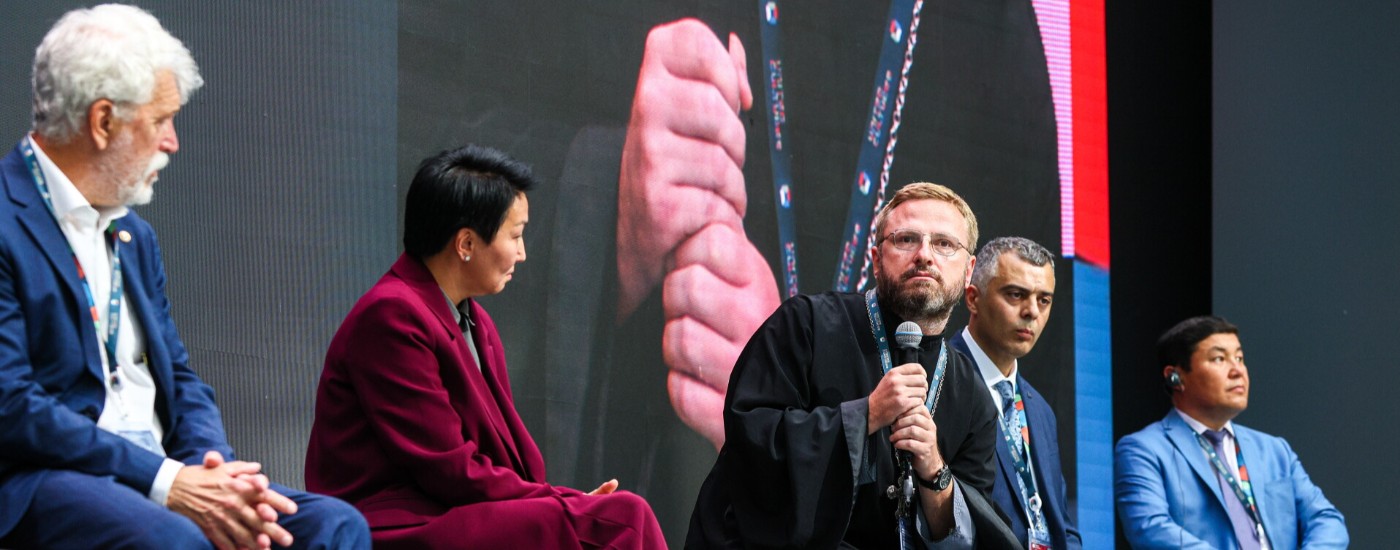At the X St. Petersburg International Forum of United Cultures, a panel discussion titled "The Right to Heritage: A Dialogue of Civilizations" took place. Speakers discussed the potential for restoring historical memory, the value of culture in society, and the issue of the right to heritage.
The panel discussion, held in the atrium of the Hermitage’s Main Headquarters, was organized as part of the thematic section "The Right to Heritage in a Multipolar World," curated by Konstantin Mogilevsky, the Deputy Minister of Science and Higher Education of the Russian Federation and co-chairman of the Russian Historical Society.
Participants in the discussion included the Vice President of the Russian Academy of Sciences, Director of the Institute of Archaeology of the Russian Academy of Sciences Nikolai Makarov, Director of the A.Kh. Margulan Institute of Archaeology Akana Ongaruly (Kazakhstan), Deputy Dean of the Faculty of Orthodox Theology named after Saint Vasily Ostrogsky at the University of East Sarajevo Darko R. Đogo (Serbia), Head of the Center for Humanitarian Studies in Central Asia at the Institute of History, Archaeology and Ethnology named after B. Jamgerchinov of the National Academy of Sciences of the Kyrgyz Republic Cholpon Koichumanova, Director of the International Institute of Central Asian Studies Rutbil Evren (Turkey), Chairman of the Society "Knowledge" (Mongolia) Khash-Erdene Sambalkhundev, and Minister of Culture and Information of the Republic of Serbia Nikola Selaković. The moderator was Konstantin Mogilevsky, curator of the thematic section "The Right to Heritage in a multipolar world," Deputy Minister of Science and Higher Education of the Russian Federation, and Co-chairman of the Russian Historical Society.
During the discussion, the experts agreed that restoring material heritage and historical memory is possible to some extent. Systematic work and willpower can recover the correct interpretations and narratives, provided the memory has not been completely lost.
"It is impossible to restore historical memory if it has been completely lost. However, it is possible to recover the memory of specific events. We can restore the correct interpretations and narratives of individual historical facts," said Nikolay Makarov.
"The process of restoring historical memory is very painstaking. If the state's educational policy has a clear direction, parts of history can be recovered," clarified Khash-Erdene Sambalkhundev Cholpon Koichumanova, who expressed that the revival and preservation of historical memory is facilitated by increased attention to historical sciences.
"It is possible to restore historical memory if it remains within a living tradition. We cannot revive any historical memory regarding the Scythians because the people have disappeared. Memory resides not only in material objects—if people retain it, it can be renewed," emphasized Darko R. Đogo.
In conclusion, Konstantin Mogilevsky invited the experts to discuss the possibility of a "right to heritage." "Right is determined by need. If heritage is needed, then there is a right to it. The quality of humanities research and national humanities schools largely ensures the right to heritage. If they exist, then there is access to heritage," Nikolay Makarov pointed out.
"Heritage is a community or nation's moral, historical, and cultural capital. It is a key component of identity. You cannot find a person who does not carry some form of heritage. The right to heritage undoubtedly exists because if we lose it, we cease to exist as human beings," concluded Nikola Selaković.






